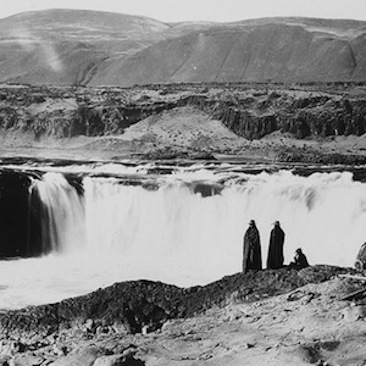Last month I vacationed for 14 glorious days in the Bahamas, dividing my time between the islands of Exuma and Eleuthera. During my week on Exuma, the Bahamians voted in national elections, held every five years. Their fervor was inspiring. Nearly every car was festooned with flags of one of the four main parties. Many citizens flew home from other countries to vote. Bahamians told me that the rancor separating supporters of the two most dominant parties, the Progressive Liberal Party and Free Party Movement, is every bit as intense as between Democrats and Republicans.
Next month the Bahamas celebrate nearly a half-century as an independent democratic nation. Universal suffrage came about in the early 1950s while the islands were still under British control. “The right to vote is the only right they can’t take away,” an employee at a George Town liquor store told me the day after the PLP won in a landslide. His confidence struck me as misplaced. And that was before I returned home to the United States and read about yet another thinly veiled attempt to keep people from voting in my increasingly undemocratic country.

April 20, 2012
Many people fret about Mitt Romney’s treatment of his dog nearly thirty years ago than about his weather-vane political convictions. I ignored the story until recently. Sure the facts troubled me. Inhumane is a mild way of describing the 12-hour vacation trip that Seamus endured in a crate atop the family station wagon. But I have bigger concerns about the GOP presidential candidate, among them his pledge to snatch health insurance away from millions of Americans. Not just the cruelty of his stance but the craven hypocrisy. After all, Romney now condemns national health-care reform like that which he successfully championed while governor of Massachusetts.
Drawing me into Crategate, finally, was Romney’s wife Ann. In a TV interview this week, she defended Seamus’ ride as something the Irish setter enjoyed. Clearly the Romneys have adopted the cynical Karl Rove tactic for distorting reality: repeatedly characterize something that’s negative as positive and voila! I’m convinced that Romney could claim over and over that the sun rises in the west and many in the electorate would see glimmers of dawn there every morning.
What’s most troubling about Romney and the dog story is his unwillingness to acknowledge a mistake. Or worse yet his inability to see the error as an error at all. Or not recognizing that even an insincere joking apology—”upon further reflection I realize that my wife Ann should have strapped me to the roof and let Seamus ride shotgun”—would deflate the story.
If Seamus was among the living and could talk, I imagine him telling Romney: “I forgive you, Mitt. But a ‘sorry’ would be nice.”
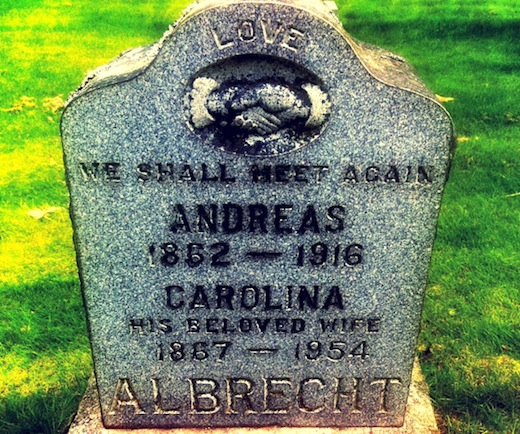
April 14, 2012
Walking among the graves of strangers on a sunny spring afternoon made me neither sad nor worried about mortality. It did have another effect: the sparse information on tombstones left me imagining the lives of people from other times and other places. They came to life again, however briefly, as I pictured the families they built and the loved ones they lost. All the dead at my feet surrounded me with vanished stories of joy and tragedy. Maybe that’s why I volunteered to take pictures at cemeteries for Find A Grave, a crowd-sourced service that has amassed 78 million grave records. The records have helped me piece together far-flung evidence of my own ancestry, including photos of grave sites of long-dead relatives. So yesterday for the first time I returned the favor.
Andreas and Carolina Albrecht were not part of my assignment at the sprawling Rose City Cemetery. I came upon their final resting place after stepping carefully amid dozens of graves. Their marker, smaller than many, stood out. It was the message engraved in the stone. Had they agreed on it before Andreas died in 1916? Or was it Carolina’s idea, conceived some time during the thirty-eight years she survived after her husband’s death? The message left me wondering about the intensity of their love and how lonely Carolina might have been for nearly four decades without Andreas. She wasn’t alone. As I later learned, the Russian emigres had seven children. Most of all I wondered whether their wish came to pass in death. Not a wish really, more like a declaration of utter certainty:
We shall meet again
We can only hope that one or both of the Albrechts knew something the living don’t.
When my late father retired, he began an emotional quest: to learn as much as he could about the father he never knew. His father walked out never to return when Dad wasn’t yet a month old. The year was 1928. My grandmother, twenty-one at the time, was a newspaper reporter as was the husband who abandoned her and disappeared. He died seven years later. When Dad finished his genealogy work in 1997, he summarized his extensive findings in his signature prose. The engineer always wrote clearly and objectively, like a dispassionate journalist.
While starting my own family-tree research recently to learn about my mother’s hidden roots, I reread Dad’s material. How did I overlook his closing paragraph fifteen years ago? Or was I too immersed in my own media career at the time to appreciate his conclusion?
As a final note, I have learned a great about what my father did, where he went, and when. However, I know virtually nothing about him as a person. I know nothing about his sense of humor, his intelligence, his interest in others, or his feelings about life.
Sadness and regret cry out from behind those words. I also hear a whispered challenge. Dad’s “I know nothing” tells me to dig deeper.
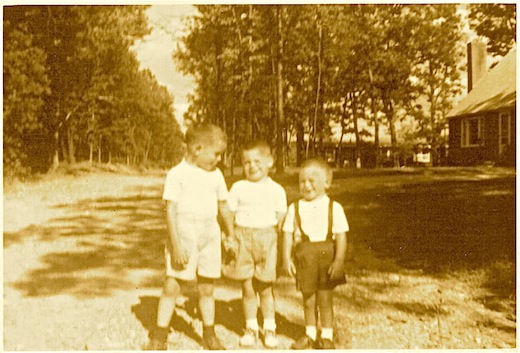
March 25, 2012
If only I could take back the mouse clicks. The ones that showed how much had changed in the once out-of-way neighborhood in Nashua, New Hampshire, home of my early childhood. I haven’t been back since moving to Florida in 1959. It was spring. I was in the third grade. Then this week while researching the maternal branch of my family tree, I found a notice in the Nashua Telegraph about my parents buying our house in 1955. I didn’t remember the street name, Intervale, but knowing it now meant I could visit virtually via Google Maps and Street View. That thought triggered a young boy’s memories. The gray Cape Cod-style home alone on a large tract. The big hill across the wide street, all trees except the sled and flying-saucer trails that my brothers and I carved. The steep, wooded slope that dropped off behind our house to a small tributary of the Nashua River where we ice-skated in perfect desolation. The path that took over where Intervale ended and meandered up another hill toward mystery.
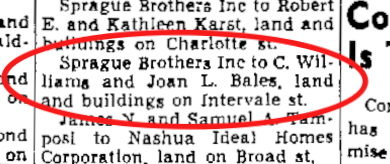 Read More
Read More
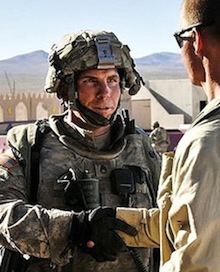
March 18, 2012
What’s in a last name? Nothing really if you think of it as a mere collection of letters. Just the opposite though if you consider the effect of hearing it aloud. Upon hearing my name an image comes to mind: an anchor thrown from a fast-drifting boat snagging the bottom. It claims and holds my place in the world. Hearing it also flashes forth images of the people I love who share it. All this occurs to me after hearing my last name said over and over on the radio and reading it repeatedly in news accounts in the last three days. I can say that until now, no one with my last name — with all its one-syllable simplicity — has been a mass-murderer guilty of a war crime. Yes, I’m prematurely passing judgment on Sgt. Robert Bales, accused of slaughtering sixteen villagers in Afghanistan, twelve of them women and children. But his guilt appears a certainty.
“Charges against ‘slay soldier’ Robert Bales expected within a week” was among the headlines in 2,670 references to the troubled man in Google’s news category when I first checked this morning. Thirty minutes later the number was 4,220. While I write an NPR reporter says “a lot has happened to Bales since 2007.” That understatement makes me think of myself, as trivial as my life has been compared to the soldier’s.
If the sergeant’s surname and mine was Smith, it would go in one ear and out the other, so to speak. No surprise, Smith is by far the most common last name in the United States. The 2000 U.S. Census found 2,376,206 Smiths. Bales ranked 2,550th with 13,028 occurrences. The infrequency of Bales lessened the odds of its link to something infamous until now. The inevitable question is whether Sgt. Bales and I are linked by blood. He was born in Norwood, Ohio, five miles from where I was born in Cincinnati. We both lived in Florida.
I’d rather not know anymore.

March 11, 2012
It’s funny what you remember decades after a memorable news event. Consider the intense controversy over John Lennon’s claim in 1966 that the Beatles were more popular than Jesus Christ. Futility Closet sent me back to that time with one its “miscellany of compendius amusements.” Christian groups from Southern Baptists to the Vatican went nuts, charging blasphemy of the highest order. I remember the protests, including record burnings, radio stations refusing to play Beatles songs, and stores banning sales of anything Beatles related. Over the Christmas holiday break that year, I turned sixteen while working at the J.C. Penney in Winter Park, Florida, which still wasn’t selling Beatles albums five months after Lennon’s comment.
For the first time I realized the power — and danger — of merely expressing an opinion. What I forgot or never read was that the Ku Klux Klan joined the protests, picketing Beatles concerts and even nailing an album to a cross, ironic symbolism no doubt lost on the group and its racist followers. Or that lightning struck the broadcast tower of a Texas radio station and injured its news director the day after the station organized a mass burning of albums. If only lightning had struck the KKK cross.
Imagine the outcry if Lennon said now what he did then, and today’s ubiquitous media of all ilk stoked the flames with vile and venom every minute of every day. Fox News might not be the safest place in a thunderstorm.
UPDATE: Creaking memory cogs now suggest that J.C. Penney continued to sell Beatles albums but kept them out of view under the counter.
When will a reporter, especially one for the mainstream media, write: “He lied. Here’s the truth.”? I long for the day and never more than this week. For two consecutive days, NPR reported on the fallout about Rush Limbaugh’s comments about the Georgetown law student Sandra Fluke. In both instances reporter David Folkenflik described what Limbaugh said but never pointed out that he repeatedly misrepresented the testimony Fluke made to a U.S. House committee. This wasn’t truth open to interpretation. The testimony was public and unambiguous: in advocating mandatory insurance coverage for contraception, she described a lesbian friend who needed birth control pills to treat a serious medical problem. Yet Limbaugh vilified Fluke for what he claimed was the nature of her sex life and her desire to have the government pay for her sexual encounters. The falsity was breathtaking. Read More
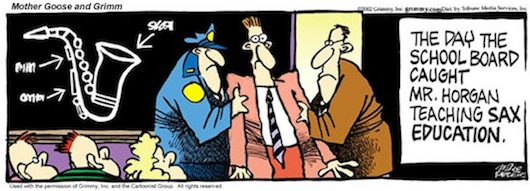
March 9, 2012
I want to teach sex education in Utah’s public schools. If the governor signs the Legislature’s recently passed bill as expected, the state will limit the curriculum to abstinence. No teaching about human sexuality, contraception, and homosexuality allowed. I’ve already written my lesson plan. It would be the same every day. Learn four words: “Just don’t do it.” How difficult is that? It guarantees an easy “A” for all students because there’s no proposal, yet, to test whether students are exercising abstinence. With so little to learn, students will have lots of free time in sex-ed classes to screw mess around. Nor will they have homework, which means none for me to grade. Talk about a cush job!
Maybe the Legislature should also change the state motto from “Industry” to “Ignorance is Bliss.” The state could station Thought Police in each class and arm them with the official state gun to make sure no sex-ed teacher broaches forbidden topics. And make sure that every class begins with students singing the official state song, which includes this lyric: Utah! With its focus on family, Utah! Helps each child to succeed.
[youtube]http://www.youtube.com/watch?v=skuEiYfnSFg&feature=related[/youtube]
Can a song “exist in a world of its own – not just timeless but ultimately outside of modern music”? One of the rare songs that does, the BBC says, is “Wichita Lineman.” I heard the song today for the first time in years and surely felt the same way I did when Glen Campbell‘s rendition of Jimmy Webb‘s evocative lyrics debuted on the radio. That was 1968, the year I graduated from high school. Campbell, making a farewell concert tour at age 75, was interviewed this morning on NPR and discussed what I hadn’t known: Alzheimer’s disease is taking hold. He sounded as if the affliction is pulling him from the present into a timeless world all his own. It must be a fearful place, but Campbell spoke with down-home grace and dignity. Long after he’s gone, perhaps a century from now, someone somewhere will stumble upon Campbell singing “Wichita Lineman” and marvel at the unbearable ache of longing that emanates from this deceivingly simple but haunting line:
And I need you more than want you, and I want you for all time.
I’m an unadulterated college football fan. My love for the game has remained steadfast even as my interest in sports in general has sharply waned. For decades I attended Florida State games, as did my brothers and father. We often suffered through intolerable heat and humidity, a family bond of sweat and devotion. Many times I wondered how the players, cloaked in protective gear and exerting themselves nearly to exhaustion, survived given my misery in the stands. (I escaped the South’s signature weather twelve years ago in moving to Oregon.) But what happens in the decades ahead as it gets hotter and hotter and drier and drier in the South? In one of my must-read-daily blogs, Climate Progress, editor Joe Romm zeroes in on the issue in an article headlined “Will Global Warming Ruin Football in the South?” With prominent climate scientists predicting the South will be nearly uninhabitable late this century, Romm points out a sad irony about a region where football ranks up there with God and country:
Indeed, it is the conservative southern U.S., especially the South central and South east, who have led the way in blocking serious climate action, as it were, making yesterday’s worst-case scenario into today’s likely outcome.
Romm says the accelerating changes will shock fans, “many of whom have been heavily disinformed by their politicians and favorite media outlets.” Far more important matters than football will occupy the overheated world that awaits my children and grandchildren, and I doubt the inevitable calls for domed, air-conditioned stadiums will be heeded. As for today’s climate change skeptics and outright deniers not just in the South but everywhere, I wonder how many have asked themselves “what if we’re wrong?” That question inevitably leads to the one I keep asking myself: “Why don’t you do more?” But the most uncomfortable thought isn’t a question: “Imagine how we’ll be remembered.”

January 31, 2012
When we were kids, my brothers and I spit a lot. Our spitting styles varied in volume, range, and sound but had the same goal: create tough-guy facades. In those days of grappling with budding masculinity, I could not have foreseen that the spit I sent flying so often would mean so much now. Saliva of all things has opened a crack in the towering black wall that hid my very distant past, revealing a path to nameless, faceless ancestors.
The crack is my DNA, identified and analyzed via spit samples I sent to the company 23andMe. Among other things, 23andMe pinpointed the distinct genetic threads of my parents that trace back to two radically different times, places, and cultures. Some 10,000 years ago, as sea levels rose dramatically as the Ice Age ended, the North Sea swallowed the likely home of my father’s ancestors, a vanished place sometimes called the Stone-Age Atlantis. Doggerland was sandwiched between modern-day Denmark, The Netherlands, and United Kingdom, and was a place of natural bounty that National Geographic has visualized. My mother’s ancestors, the reviled and persecuted Roma people, often called gypsies — fled Eastern Europe for Portugal around the 15th century. They arrived in Europe from India more than 1,000 years ago. My mother’s genetic subgroup is among the smallest so far identified, and my father’s is the most prevalent in Europe today.
Armed with this information, I find myself wondering how these backgrounds influenced my parents, who had no inkling of their deepest roots. It’s difficult not to ascribe characteristics to them based on what little is known about their ancestors. My father loved the water so much that he made sure his sons were raised on the shore of a Florida lake. We visited the ocean often as well. With all her qualities my mother had a fiery, mercurial temperament and other traits that one might associate with the stereotypical image of gypsies. Have two people so different ever married?
The genetic path I explore through them stretches far back, past darkness. Much searching remains. The path also leads in the other direction, to me, and forward beyond the horizon.

January 25, 2012
Thankfully no one can see our dreams. In these impenetrable realms we have no choice but to watch bizarre and disjointed narratives starring ourselves in roles not of our choosing. Like everyone I suppose, I want to attach meaning to my dreams. But aren’t they random shards of memory reassembled into stories that never were and never meant to be?
Then again such thinking keeps me from enjoying, even reveling in, reunions with loved ones and friends, some dead for decades. Take last night’s encounter with high school buddies: two with whom I still talk, one who died from injuries in a college accident — his paralyzed legs withered but his smile back, and inevitably the girl who exited the dream with too much unsaid. If asked to write the plot’s highlights, I would deliver an empty page. Only the actors go unforgotten.
Maybe like all others the dream was merely the brain clearing its cache and rebooting for the next day, an automatic mental house cleaning. I choose to think last night’s dream was more. Upon waking a feeling lingered for a few moments then slipped away. Putting it to words now doesn’t bring back the feeling but captures why it felt so good: unburdened by the weight of so many years, we were together again.










